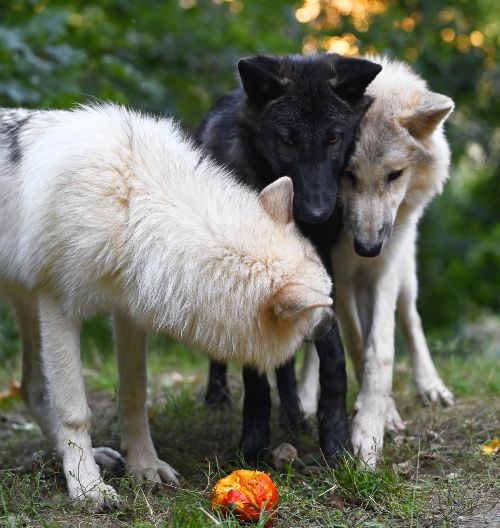Puppy Tales
Elise van den Nieuwelaar (Assistant puppy raiser)
21.01.2025

For the first time in eight years, the Wolf Science Center raised wolf pups. Here are some tales from an assistant puppy raiser about the new additions: Meeko, Kaya, and Aiyana.
At the WSC, the goal of raising wolf pups is to build strong, healthy bonds with them while meeting their needs every step of the way. This approach establishes deep trust, enabling us to study their behaviour in ways that wouldn’t otherwise be possible. The care they receive during their first months lays the foundation for the rest of their lives.
Once the pups arrived, the trainers became their caregivers. Daily tasks included keeping them company, preparing their meals to introduce them to a variety of tastes, cleaning their enclosures to give them a safe and fresh environment to explore and play in, etc. This kept us nicely busy, but the hard work was rewarding. They seemed to grow taller or learn something new each day.
The trainers weren’t the only ones raising the pups. The trainers’ pet dogs played an important role in socializing the pups. The dogs provided comfort, taught boundaries, and communicated in ways we couldn’t. Each dog approached the role differently—most enjoyed playing with the pups, a few quickly learned to guard their tails from curious pup explorations, and all seemed to love their puppy shifts as much as we did. The bond between the pups and the dogs is strong. This connection not only helps the pups now, but the dogs can also help them handle new situations in the future by giving them social support.
The pups got to explore outside their enclosure during walks through the park. These outings were a great way for them to experience new environments and get comfortable in unfamiliar situations. They climbed on everything, investigated other animals in the park, and took in all the new smells. Managing their leash was more of a learning curve for me than for them. Soon after, the adult wolves started joining these walks, helping the pups bond with them in a neutral environment.
After five months, the pups became more independent, and human presence was gradually reduced. The next step in the raising process is integrating them with the adult wolves so they can learn even more from them. This process doesn’t happen overnight. The pups meet their potential future packmates, first through fence-to-fence meetings, then shared walks, and even have supervised visits. These integration sessions continue until the trainers feel confident that the pups can successfully join their new pack.
It’s been an honour to be part of their growing world and see them develop into beautiful, intelligent, and confident wolves. Meeko is gentle and emotionally intelligent. Kaya is brave and steady. Aiyana is playful and curious. Despite their differences, they stick together when they’re not out adventuring. From exploring enclosures, walks in the park, and meeting new people and adult wolves, their world keeps expanding—and they’re doing great every step of the way.